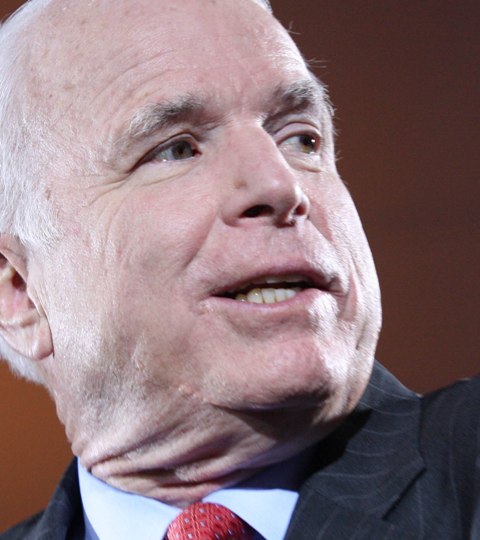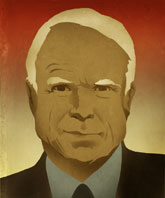No Friend of Solar Power
During the first presidential debate, McCain said that “No one in Arizona is against solar” as he championed alternative energy development. But people in his home state say the senator has not been helpful in developing its most abundant resource -- sunshine.
Jul 31, 2020903 Shares300.8K Views
Sen. John McCain (WDC Pix)
PHOENIX— In one of the most contested exchanges from the first presidential debate, Sen. Barack Obama attacked Sen. John McCain’s voting record on alternative energy.
“Over 26 years, Sen. McCain voted 23 times against alternative energy like solar and wind and bio-diesel,” Obama said.
McCain dismissed Obama’s statement as if it were an absurd claim. “No one in Arizona is against solar,” McCain retorted.
Illustration by: Matt Mahurin
Moments later, Obama sought to make another point about McCain and Arizona. The Arizona senator interrupted the Democratic presidential nominee to make a sweeping assertion about his unwavering support for alternative energy development: “I have voted for alternate fuel all of my time,” McCain said, “and no one can be opposed to alternate energy.”
McCain’s legislative record shows otherwise.
Michael Neary, president of the Arizona Solar Energy Industries Association, a non-profit trade association, said McCain frequently says he supports renewable energy development, but his deeds do not match his words. McCain, Neary said, has skipped many important votes or voted against measures that would spur alternative sources like solar and wind.
“If he was truly an ally of alternative energy, he would have taken the time to get out there and vote and maybe rally some of the troops on the Republican side to get [measures] passed,” Neary said. “That’s something he hasn’t done, and this is extremely important to Arizona.”
McCain’s underwhelming support of alternative energy is well known to Arizona’s solar industry leaders, several of whom were surprised to hear the GOP presidential candidate proclaim his strong support for solar during the first debate. McCain’s campaign and Senate office did not return numerous phone calls and emails seeking comment.
Vivian Harte, chairwoman of the Arizona Solar Energy Assn., a statewide solar-advocacy group, said McCain’s backing was needed last winter when a renewable energy tax-incentive bill came within one vote of clearing the Senate. McCain, however, failed to go to the Senate floor and cast a vote — though he was in the Washington area.
Harte said her ears perked up during the debate when McCain declared that no one in Arizona is against solar. “I was surprised to hear that,” she said, “because he has voted against incentives in the past.”
McCain’s resistance to passing tax incentives threatens to derail Arizona’s solar industry just as it is poised to become one of the biggest players in the world. The state, experts say, has the potential to provide a significant share of the nation’s electricity supply. But so far, there has been relatively little interest in developing Arizona’s most plentiful natural resource — sunshine.
Harte said industry technical studies indicate that 10,000 square miles of solar-energy generating facilities in the state’s Southwestern deserts could produce electricity for the entire county. “We have the space and we have the sun,” she said. “Certainly, the Southwestern U.S. should be using a lot of solar power.”
Arizona’s fledgling solar industry heaved a sigh of relief Friday, when President George W. Bush signed the $700-billion Wall Street bailout bill, which included legislation extending and expanding tax incentives for alternative energy that were set to expire at the end of 2008.
The incentives, says Arizona Public Service Co. spokesman Jim McDonald, are vital to the development of alternative energy here. “It’s important to Arizona,” he said.
McCain voted in favor of the financial-rescue bill last week. In doing so, he reversed his history of opposing tax incentives for renewable energy.
In 2004, McCain introduced an amendment that would have eliminated the alternative energy tax credits. In March 2006, he voted against extension of the incentives. In 2007, the senator missed three votes to extend the tax credits set to expire this year.
McCain’s claim during the first presidential debate to support renewable energy is an extension of assertions made in his campaign ads that have come under fire from environmental groups. One adlinks McCain to renewable energy, stating that it would be used to “transform our economy, create jobs and energy independence.”
The Sierra Club said the ad is “completely false and misleading” because McCain “has a long record of consistently voting against renewable energy.” The environmental group said in a statement that McCain voted twice in August to block extending renewable-energy incentives to push through offshore oil drilling legislation.
The environmental group also criticized McCain for being the only senator not present for the February vote on an economic stimulus bill that included incentives for renewable energy. McCain’s campaign plane had arrived at Dulles International Airport, about 20 miles west of Washington, shortly before the vote. McCain skipped the debate and vote, telling the Associated Press that he was “too busy” and “focused on other stuff.”
The bill received 59 votes, one short of that needed to cut off debate and allow it to proceed to the floor, where only 51 votes were needed for passage. The next day, McCain voted for a revised economic stimulus bill — one stripped of incentives for clean energy — and it passed the Senate.
Uncertainty over whether the incentives would be renewed has played havoc with solar projects in Arizona. Some were canceled because there wouldn’t be time to finish them this year to qualify for the tax credits. “The whole solar industry was starting to drag,” said a state economic development official.
One threatened project was construction of the world’s largest solar electric generating station, to be built about 70 miles southwest of Phoenix. The Solana power plant would have been derailed if the 30 percent tax credit on the cost of construction had not been extended another eight years.
Abengoa Solar Inc., a Spanish energy company, is planning to build the $1.2-billion facility near the small town of Gila Bend, Ariz. The facility will produce 280 megawatts of power when completed in 2011, enough electricity for 70,000 homes.
Arizona Public Service, the state’s largest electric utility, has a contract to purchase all the electricity produced by the solar plant, estimated to be worth $4 billion over 30 years. Plant construction is expected to create about 1,500 jobs, and the facility is expected to employ 85 skilled technicians. The plant stores energy in saltwater tanks, allowing it to produce electricity for several hours after the sun sets.
In testimony last March before the House Select Committee on Energy Independence and Global Warming, a representative of the Arizona Public Service warned that without the incentives, construction of emission-free sources of electricity like Solana would not happen. “Without these tax credits, large scale solar projects, including Solana, are simply not affordable today,” Barbara Lockwood, APS manager of renewable resources, said in a statement.
Passage of the law clears the way for APS and Abengoa to move forward. Lockwood said the utility is committed to making Arizona “the solar capital of the world and bringing affordable renewable energy to all of its customers.”
Reaching this goal won’t be easy. APS is now reliant on nuclear power, coal and natural-gas-fired generating plants. The utility operates the largest commercial nuclear generating station in the world, with 3,825-megawatt capacity. It owns 29 percent of the triple-reactor Palo Verde Nuclear Generating station, 50 miles west of Phoenix.
The amount of solar power used in Arizona remains a tiny fraction of the energy produced by fossil fuels and nuclear power. APS has installed only 5 megawatts of solar power in the last 20 years. The utility is also planning to build a second large solar facility, working with Nevada utilities, that would generate approximately 250 megawatts. But to keep up with growing demand, APS would have to build one 250-megawatt solar plant a year.
Arizona regulators are pushing the state’s public utilities to generate more power from alternative sources. APS and other utilities must generate at least 15 percent of its energy from renewable sources by 2025 under new regulatory rules.
Congress has tried to pass legislation requiring the nation’s utilities to produce more power from renewable sources. McCain has voted against implementing federal standards.
McCain has close ties to APS, and its parent company, Pinnacle West Capital Corp. Robbie Aiken, Pinnacle West’s chief Washington lobbyist, is an unpaid volunteer for the McCain campaign. He is helping with advance fieldworkand fund-raising. Aiken was also involved in McCain’s 2000 presidential campaign.
Pinnacle West executives, including Aiken, have made personal contributions totaling at least $25,000 to the McCain’s presidential campaign since January 2007. Meanwhile, Pinnacle West chairman, William Post, has raised at least $100,000 for McCain by bundling contributions. Steve Betts, president of SunCor, a Pinnacle West real-estate subsidiary, has also raised at least $100,000 for McCain.
Rather than supporting renewable energy, McCain has made expansion of nuclear energy the centerpiece of his energy policy. During the Sept. 26 debate, he said construction of 45 nuclear power plants would create 700,000 jobs and help the U.S. reduce reliance on foreign energy.
McCain’s call for more nuclear energy has triggered concernin northern Arizona, where widespread radiation contamination from the postwar uranium mining boom, whicht continued until the 1970s, harmed the health of thousands of people.
Harte, of the Arizona Solar Energy Assn., said she doesn’t expect McCain to do much for renewable energy if elected president. “He talks with passion about nuclear power,” she said. “That’s really where his focus is.”

Hajra Shannon
Reviewer
Latest Articles
Popular Articles

